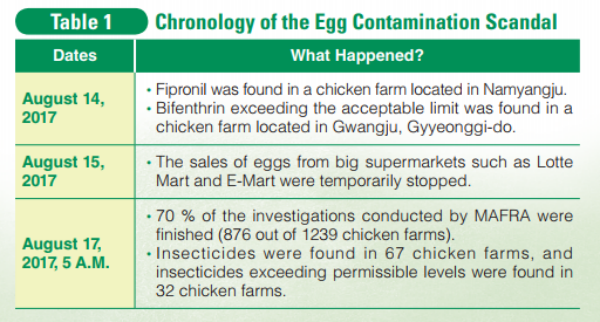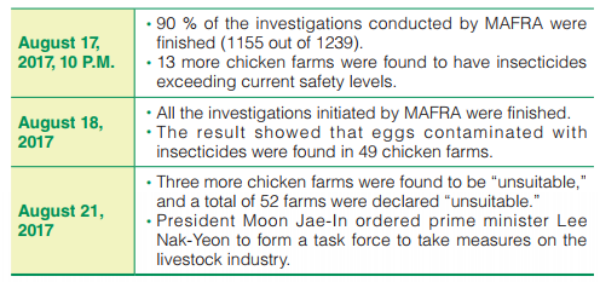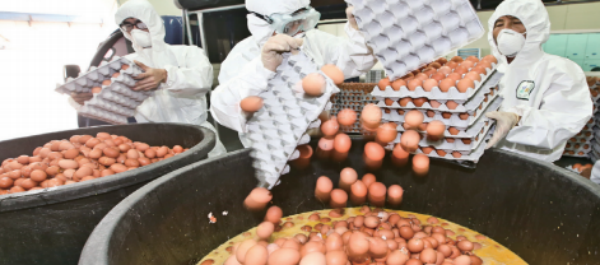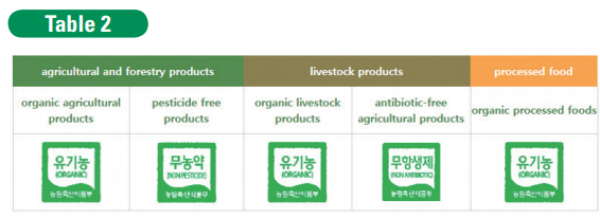On August 14, 2017, eggs contaminated with the insecticide fipronil and bifenthrin were first found in two chicken farms. According to thorough investigations conducted by the Ministry of Agriculture, Food, and Rural Affairs (MAFRA) on chicken farms, eggs produced from 52 farms, as of August 21, were declared unsuitable for consumption. This egg contamination scandal was particularly shocking for most citizens because 31 out of 52 farms had already received eco-friendly agricultural products certification from the National Agricultural Products Quality Management Service (NAQS). That is, there was a loophole in the eco-friendly agricultural products certification system. Thus, the Sungkyun Times (SKT) now examines what the eco-friendly agricultural products certification label is, how it is obtained, and what the government has planned to solve those problems.
Egg Contamination Scandal in South Korea
Since questions on the issues surrounding the eco-friendly agricultural products certification in Korea were first raised through the egg contamination scandal, it is beneficial for Kingos to know more about the scandal to have a better understanding of problems regarding the eco-friendly agricultural products certification system.



Seriousness of the Scandal
Some people may be curious why this scandal even matters, but it is extremely significant in three ways. Firstly, farms with antibiotic-free agricultural products certification, a type of eco-friendly agricultural products certification, should never use insecticides. What is even worse is that fipronil, one of the insecticides used in chicken farms, can be used for catching ticks and fleas only on companion animals, but not on animals raised for food. Thus, the use of fipronil on chicken farms is illegal. Secondly, insecticides used in chicken farms are detrimental to humans. Fipronil causes vomiting, abdominal pain, and dizziness. If it is accumulated in the body, it damages internal organs such as the liver and kidneys that filter harmful substances. Bifenthrin is completely harmless if absorbed through the skin, but it may cause nausea, vomiting, diarrhea, excessive salivation, and fatigue if eaten. In severe cases, it may also cause pulmonary edema and muscle spasms. Thirdly, consumers were deceived. Although eggs with eco-friendly certification were twice more expensive than normal eggs, consumers still bought eggs with eco-friendly certification because they prefer “healthy” food. Consumers felt betrayed, however, since it was found that the former is not different from the latter. After the egg contamination scandal, consumers started to doubt the credibility of eco-friendly agricultural products certification labels
What is Eco-friendly Agricultural Products Certification?
Eco-friendly Agricultural Products Certification System
The Eco-friendly Agricultural Products Certification System is a system where the government certifies the safety of eco-friendly agricultural and livestock products which are strictly selected and inspected by special certification agencies. It has not been long since the system was first introduced. The system began when the Environment-friendly Agricultural Fosterage Act was passed and NAQS started to manage and supervise farms with the ecofriendly agricultural products certification in 1998.
New certification, renewal, and post-management tasks were transferred to private certification agencies in 2002. From 2017, private certification agencies have been responsible for all tasks, while NAQS only manages and supervises those agencies. The system was introduced to protect both producers and consumers from falsified eco-friendly agricultural products, to establish a production and supply system of eco-friendly agricultural products by building trust during the distribution process, and to reduce environmental pollution caused by agriculture.
People may think that the certification is only given to a few farms that underwent strict inspection, but in reality, it is not. Farms can easily transform into eco-friendly farms by having proper housing conditions and feeding management regulations. The certification process includes application, documents and on-site examinations, notification of the result, and post management of production shipping process and market survey. When farmers prepare documents and apply with inspection materials, the private agencies come to and inspect farms at a farmers’ desired time and give the certification after conducting tests such as a non-antibiotic test and a water quality test. After farms receive the certification, they go through post-inspections. Marketed products of the certified products are checked to see whether the contents and the displayed items are matched, and if any abnormality such as a violation of certification standards is discovered, administrative dispositions and accusations follow. There are many types of eco-friendly agricultural products certification labels, and they can be seen in the table (Table 2) below. Eggs produced from farms with the eco-friendly certification label are antibiotic-free agricultural products.

Why do farms desperately want Eco-friendly Agricultural Products Certification?
Farms work hard to receive eco-friendly agricultural products certification because the certification benefits farms in two ways. Firstly, agricultural products with eco-friendly certification labels are sold at higher prices. For example, eggs with eco-friendly certification were sold at ₩190 each, while normal eggs were sold at ₩100 each. Secondly, farms with eco-friendly certification receive subsidies from the government. The government gives ₩1~10 per egg, and farms with eco-friendly certification can receive the maximum of ₩20 million~₩30 million every year for three to five years.
Problems with Current Eco-friendly Certification System in Korea and Government Accommodations
Links Between Private Certification Agencies and NAQS
The current system is one where private certification agencies receive ₩100,000 per certification. That is, the more certifications agencies give out, the more money they earn. Due to the current system, poor inspections were done to hand out more certifications, and they were possible because there are relations between the private certification agencies that should do all the tasks and NAQS, the body that monitors those agencies. Currently, the CEOs of five out of 64 private certificate agencies are retirees from NAQS. It is also calculated that out of the total 610 employees of private certification agencies, 80 people are retirees from NAQS. On account of this relationship, poor inspections were made, and the relationship eventually led to the egg contamination scandal.
n order to break the links between private certification agencies and NAQS, on August 22, 2017, the Minister of Agriculture, Food, and Rural Affairs Kim Young-Rok said that he would review measures to restrict the employment of retired officials in the agricultural and livestock sector. Currently, only the officials at the fourth level or higher are subjects of regulation, not being able to work in the same sector for three years after they retire. This regulation, however, is not effective because only 20 out of 1400 NAQS employees are at the fourth level or higher. The National Policy Agency (NPA) also announced that it will carry out special investigation on illegal acts associated with eco-friendly certification from August 28 to October 31. NPA asserted that it will cooperate with the Korea Food and Drug Administration (KFDA) and MAFRA to actively crack down on illegal activities and that agencies violating the law will be severely punished to prevent their second violation. The government may also confiscate agencies’ privileges and do the whole certification process by itself.
Poor Post-management
The current post management regulations require that post-inspections on residual insecticides and the use of antibiotics be done at least once a year. Since budget, inspectors, and inspecting facilities are insufficient, however, most inspections are conducted only once a year. As it is mentioned earlier, insecticides should never be used for antibiotic-free agricultural products, but the problem is that insecticide inspections are required to be carried out only when farms receive their eco-friendly certifications for the first time. Since the inspections are not mandatory afterwards, insecticide inspections rarely take place. What is even worse, even the only one-time event inspections are perfunctory. The regulations stipulate that inspectors must regularly check whether farms properly manage pesticides, but all they do is just skim over farming daily logs, journals with accurate descriptions of the climate conditions such as working days and temperature and of the details of the work. Farms that have been certified as eco-friendly must keep records of the purchase, use, and storage of insecticides for a year, but if farms intentionally do not keep records of them, it is impossible to know whether they used pesticides or not.
The following examples additionally show how perfunctory and insufficient post-management is. Firstly, a farm located in Naju passed post-inspections earlier this year, but through investigations conducted by the KFDA, 0.21mg/kg of bifenthrin, which is 21 times more than the standard value of 0.01 mg/ kg, was detected at this farm. Secondly, beef and pork farms do not use pesticides, but overdose of antibiotics is a huge problem since some farms have antibiotic-free agricultural certification. Since antibiotics are tested only at the slaughterhouse, farmers keep using antibiotics until their cows and pigs are sent to the slaughterhouse. Last year, 496 tons of antibiotics were used to raise 10.36 million pigs, whereas Denmark, that raised two million more pigs, used only 81 tons of antibiotics.
The government said that it will have farms to install closed circuit TV (CCTV) to regularly check farms and the safety of livestock. Preventive activities will be taken in all poultry facilities such as farms, hatcheries, traditional markets, and garden restaurants twice a year, and monthly preventive activities will be done for vulnerable facilities. The government also plans to improve working conditions of irregular workers to boost their morale and ultimately improve post-management.
Weak Penalties for Farmers and Private Certification Agencies
Both farmers with eco-friendly certification and private certification agencies are not severely punished when they violate the law. Firstly, farmers with eco-friendly certification are in the blind spot of the law. Although insecticides are detected in eco-friendly farms, farmers can still sell their products without eco-friendly certification labels if insecticides detected are below the standard level. A year after farms lose their eco-friendly title, farms can immediately apply to get their eco-friendly title back again. Secondly, private certification agencies that violated the law only receive light punishment. According to MAFRA’s Status of Poor Eco-friendly Certification Detection of Private Certification Agencies, 62 eco-friendly farms were found to have violated the law since 2014. While most of the agencies were ordered to suspend their business for three to six months, only 10 agencies permanently closed down. The government declared that from 2018, new eco-friendly certifications will be given only to animal welfare farms. It thinks that it is not possible to solve the problem of pesticide misuse and abuse as well as livestock disease unless the current factory based densely maintained farms change. The government also plans to change the rule. Before, the consequence of violating ecofriendly standards once or twice was not severe, but from now, the government may adopt a “One strike and out rule,” meaning that if you get caught violating eco-friendly standards, you are out of the system for good. For example, the government may prohibit private agencies that violated the law from distributing eggs to make them feel burdensome.
Due to the egg contamination scandal, most citizens felt angry and betrayed by the deceptive private certification agencies, NAQS, and the government. What is worse is that not only the credibility of eggs, but also the credibility of other agricultural and livestock products is low. It will be interesting to see how the government will manage to heal its broken credibility
